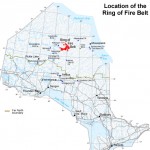The MP for Owen Sound opens old wounds on Native fishing rights in the Bruce Peninsula.
by David McLaren
"With the Natives pushing to come into the Bays, it is a deliberate attempt at confrontation. That’s what they want.” Larry Miller, (Con, Bruce-Grey-Owen Sound) chose somewhat inflammatory language when he criticized a new Aboriginal commercial fishing agreement signed between Ontario and the Saugeen Ojibway Nation (SON) and released March 12.
That Agreement is the third since 2000. It sets the terms by which the two First Nations on the Bruce Peninsula in Ontario will practice their aboriginal and treaty rights to fish commercially.
The Agreement has local sportsmen’s clubs steamed because, unlike the two previous Agreements, it provides no guarantees Native fishermen won’t set their nets deep inside Colpoy’s Bay at Wiarton and Owen Sound Bay. That’s where the clubs do most of their stocking of Chinook salmon and trout.
On an Owen Sound phone-in radio show on March 13, Miller said, “It’s common knowledge that the Natives don’t want any stocking done. Cuttin’ one finger at a time, except this time they cut off maybe a hand.”
Strong language such as this is bound to stir up hard feelings left over from the horrific events of 1995. The two bays are within the SON fishing territory and their Band members have every right to set nets there, as they did before they were pushed out a couple of generations ago.
Miller said: “The announcement they were going to fish in the bays was the insult. Now, to pay taxpayers money on top of it, it’s like puttin’ a man down and puttin’ the boots to him.”
The money he is referring to is $850,000 Ontario will stream to SON over 5 years to pay for monitoring and enforcement. That works out to roughly $85,000 a year for each reserve to pay a biologist, data collection, communications, and equip boats and trucks.
Miller said: “When they get done with this five-year Agreement, you think the fish count is down now, it’ll be a lot worse. … It’s not about fairness. What it is, is reverse racism.”
In fact, this is the third such Agreement. SON has been fishing commercially in Georgian Bay and Lake Huron (see map) for nearly 20 years — ever since 1993, when an Ontario court recognized their Constitutionally protected aboriginal and treaty rights to do so. There is no evidence fish stocks have declined because of the Native fishery. However, there are other, more worrying factors: climate change, degrading habitat, shoreline development, and declining food biomass.
Miller said: “This won’t hurt just the city of Owen Sound. It affects everybody around, whether your business is in Owen Sound or Meaford or Leith or Lion’s Head. It’s all about tourism.”
Local sportsmen’s clubs hold several fishing derbies over the summer, culminating in the Salmon Spectacular at the end of August. Last year, they had one of their best years, with contestants catching salmon that were bigger and heavier than ever.
Miller said: “There’s a double standard out there. Nobody is anti-Native. What they’re anti is double standard. Everybody needs to be equal.”
To treat everyone “the same” would mean denying First Nations the protection section 35 of the Constitution affords their rights to fish, hunt and gather. The 1993 Jones-Nadjiwon decision ruled the Ministry of Natural Resources’ management regime had discriminated against the two First Nations and was therefore of no effect. That meant negotiating another arrangement. Hence the first Agreement in 2000.
Miller said: “This is a deliberate antagonism from the Natives. They know or should have known what the reaction would be.”
He has no evidence of this. However, to be fair, Miller had tried to get hold of Chief Kahgee and Chief Lee before going on the phone-in show. Neither Chief called him back and no one from Nawash or Saugeen has responded to repeated requests from the media for comment.
Nevertheless, the kind of statements Miller has been making, without first talking to the First Nations (or, it seems, the MNR), only serve to open old wounds, first inflicted in the 1990s "fishing wars" in the Bruce.
Words that inflame can lead to actions that injure, as Justice Linden pointed out in his Report of the Ipperwash Inquiry. In that confrontation, similar comments from elected officials served to ramp up tensions until things turned violent.
While one can understand the frustration of not being told of the Agreement beforehand, never mind not being consulted during its negotiation, everyone should take a step back and remember that Native nets have been in the waters of Georgian Bay and Lake Huron for 20 years without damaging either the sports or the commercial fishery.
Those points were made by more responsible observers than Miller — Josh Choronzey in a column in the Sun Times, March 14 and Phil McNichol in his column March 16.
The Saugeen Ojibway Nation, worried about encroachment on their fishing grounds obtained a Royal proclamation from Queen Victoria 1847 asserting their fishing territory. Notwithstanding the Royal document, their fishing areas (primarily around the islands) were leased to non-Native fishermen by the government; first with permission, then without either consultation or permission.
The sturgeon was gone by 1900 — fished for their eggs. Non-Native fishermen piled their carcasses on the FishingIsland in Lake Huron and burned them. The lake trout were gone by the 1950s, devastated by aggressive fishing and the lamprey eel (an invasive species). SON fishermen were squeezed into a postage size area north of Nawash.
Nawash fishermen were charged and convicted repeatedly for fishing over an imposed quota until the Jones-Nadjiwon decision of 1993. That decision:
- Recognized SON’s right to fish commercially.
- Judge Fairgrieve also found that the Crown had not consulted the First Nations on its regulatory regime and, in any event, had discriminated against Native fishermen. He ruled MNR’s management regime had no force against the FNs.
- Opened the doors from a return (after some 150 years) to fishing for trade and commerce anywhere in their traditional fishing waters—including Colpoy’s Bay and Owen Sound Bay.
In spite of the court ruling, violence broke out in Owen Sound and in the Bays in 1995 — the same summer that Dudley George was killed by the OPP at Ipperwash. During that summer:
- SON tugs were vandalized.
- A Nawash woman selling fish at the Owen Sound farmers’ market was accosted by a group of sportsmen protesting Native fishing
- A Native man was murdered, possibly over a dispute about the Ipperwash stand- off
- Over 20 km of Native nets were stolen or cut adrift<
- Four youth were beaten, two stabbed after being attacked by about 20 non-Native youths.
- Francis Nadjiwan’s tug was burned to the hull at the government [dock] in Oliphant.
In 1999, MNR enforcement officers were still harassing SON fishermen by taking up their nets and arbitrarily closing sections of their fishery. During one such closure, the husband of the woman who had been harassed at the Farmers’ market in 1995 went out on a choppy Georgian Bay to retrieve his nets before the MNR could lift them. He fell out of his open motor boat and drowned. It was revealed later, during a judicial review, that the closure order was invalid.
Notwithstanding the clear ruling and the violence, it took the Harris government 7 years from the date of the Jones-Nadjiwon decision to come to the table. SON and MNR signed the first Fishing Agreement in 2000 and the second in 2005. Third party interests, such as sportsmen’s clubs, were (and are) supposed to be represented by the Crown during negotiations.

 David McLaren has worked for government, the private sector, arts groups, environmental groups and First Nations in communications and policy analysis. He is an award-winning writer living at Neyaashiinigamiing (Cape Croker) on the Bruce Peninsula in Ontario, who finds himself in Toronto temporarily.
David McLaren has worked for government, the private sector, arts groups, environmental groups and First Nations in communications and policy analysis. He is an award-winning writer living at Neyaashiinigamiing (Cape Croker) on the Bruce Peninsula in Ontario, who finds himself in Toronto temporarily.
